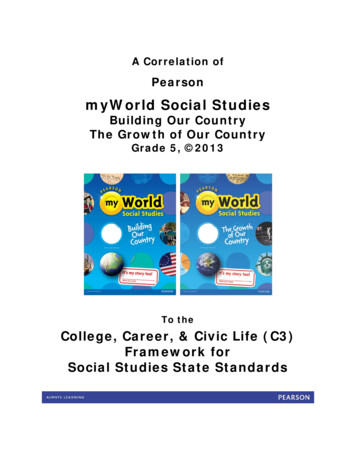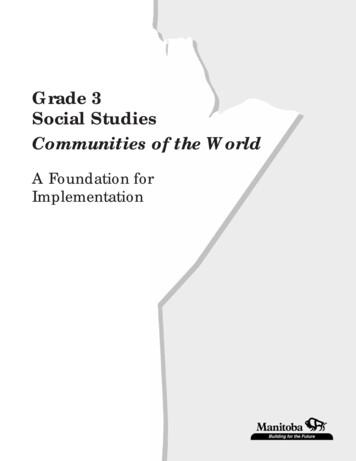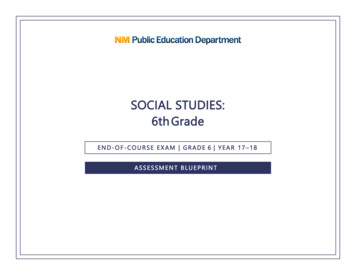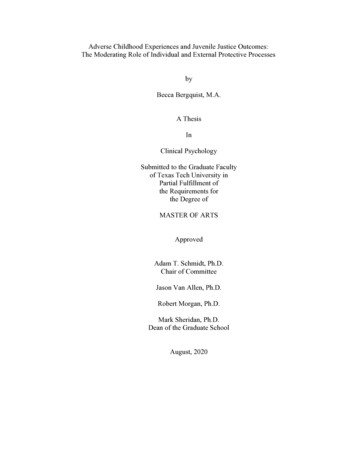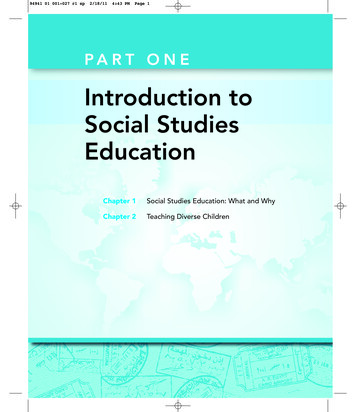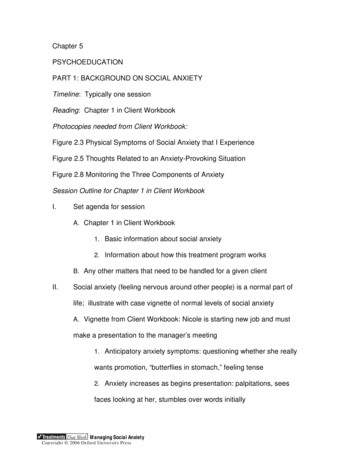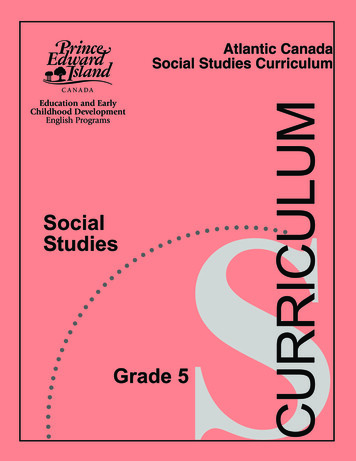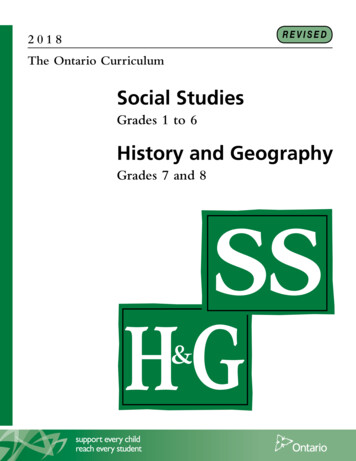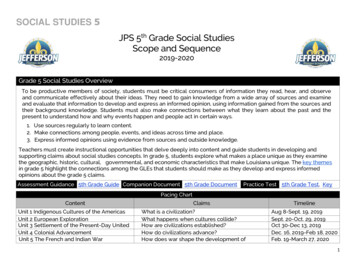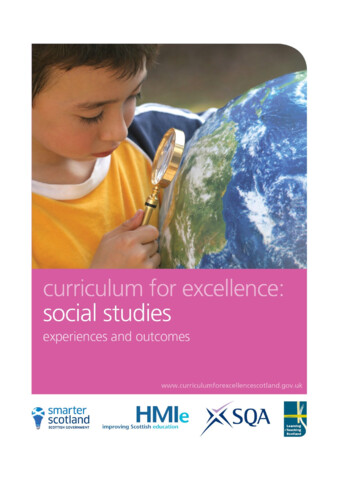
Transcription
Social studiesExperiences and outcomesLearning in the social studies will enable me to: develop my understanding of the history, heritage and culture of Scotland, and an appreciation of my local and national heritage within the worldbroaden my understanding of the world by learning about human activities and achievements in the past and presentdevelop my understanding of my own values, beliefs and cultures and those of othersdevelop my understanding of the principles of democracy and citizenship through experience of critical and independent thinkingexplore and evaluate different types of sources and evidencelearn how to locate, explore and link periods, people and events in time and placelearn how to locate, explore and link features and places locally and further afieldengage in activities which encourage enterprising attitudesdevelop an understanding of concepts that stimulate enterprise and influence businessestablish firm foundations for lifelong learning and for further specialised study and careers.Social studies: experiences and outcomes1
People, past events and societiesEarlyFirstI am aware that differenttypes of evidence can helpme to find out about the past.I understand that evidencevaries in the extent to whichit can be trusted and can usethis in learning about thepast.I can use primary andsecondary sourcesselectively to researchevents in the past.By exploring places,investigating artefacts andlocating them in time, I havedeveloped an awareness ofthe ways we remember andpreserve Scotland’s history.I can interpret historicalevidence from a range ofperiods to help to build apicture of Scotland’s heritageand my sense of chronology.SOC 0-01aSecondSOC 1-01aI can make a personal link tothe past by exploring items orimages connected withimportant individuals orspecial events in my life.SOC 0-02aSOC 1-02aI can use evidence torecreate the story of a placeor individual of local historicalinterest.SOC 1-03aThirdSOC 2-01aSOC 2-02aI can use my knowledge of ahistorical period to interpretthe evidence and present aninformed view.I can evaluate conflictingsources of evidence tosustain a line of argument.I can make links between mycurrent and previous studies,and show my understandingof how people and eventshave contributed to thedevelopment of the Scottishnation.I have developed a sense ofmy heritage and identity as aBritish, European or globalcitizen and can presentarguments about theimportance of respecting theheritage and identity ofothers.SOC 3-01aSOC 3-02aI can investigate a Scottishhistorical theme to discoverhow past events or theactions of individuals orgroups have shaped Scottishsociety.SOC 2-03aSocial studies: experiences and outcomesFourthSOC 4-01aSOC 4-02aI can explain why a group ofpeople from beyond Scotlandsettled here in the past anddiscuss the impact they havehad on the life and culture ofScotland.SOC 3-03a2
People, past events and societies (continued)EarlyFirstI have explored how peoplelived in the past and haveused imaginative play toshow how their lives weredifferent from my own andthe people around me.I can compare aspects ofpeople’s daily lives in thepast with my own by usinghistorical evidence or theexperience of recreating anhistorical setting.SOC 0-04aSOC 1-04aSecondThirdI can compare and contrast asociety in the past with myown and contribute to adiscussion of the similaritiesand differences.I can explain the similaritiesand differences between thelifestyles, values andattitudes of people in the pastby comparing Scotland with asociety in Europe orelsewhere.SOC 2-04aFourthSOC 3-04aBy studying groups in pastsocieties who experiencedinequality, I can explain thereasons for the inequalityand evaluate how groups orindividuals addressed it.SOC 4-04aI can describe the mainfeatures of conflicting worldbelief systems in the pastand can present informedviews on the consequencesof such conflict for societiesthen and since.SOC 4-04bI can make reasonedjudgements about how theexercise of power affects therights and responsibilities ofcitizens by comparing a moredemocratic and a lessdemocratic society.SOC 4-04cSocial studies: experiences and outcomes3
People, past events and societies (continued)EarlyFirstSecondThirdFourthI can describe the factorscontributing to a major social,political or economic changein the past and can assessthe impact on people’s lives.I can present supportedconclusions about the social,political and economicimpacts of a technologicalchange in the past.SOC 3-05aSOC 4-05aI can evaluate the changeswhich have taken place in anindustry in Scotland’s pastand can debate their impact.SOC 4-05bI have investigated ameeting of cultures in thepast and can analyse theimpact on the societiesinvolved.SOC 4-05cSocial studies: experiences and outcomes4
People, past events and societies (continued)EarlyFirstSecondThirdHaving selected a significantindividual from the past, I cancontribute to a discussion onthe influence of their actions,then and since.I can discuss why people andevents from a particular timein the past were important,placing them within ahistorical sequence.I can discuss the motives ofthose involved in a significantturning point in the past andassess the consequences ithad then and since.Having critically analysed asignificant historical event, Ican assess the relativeimportance of factorscontributing to the event.Through researching, I canidentify possible causes of apast conflict and report onthe impact it has had on thelives of people at that time.I can express an informedview about the changingnature of conflict over time,appreciate its impact andempathise with theexperiences of thoseinvolved.SOC 1-06aSOC 2-06aFourthSOC 3-06aSOC 3-06bSOC 4-06aSOC 4-06bI can describe attempts toresolve an internationalconflict and maintain thepeace and can present myconclusion about howeffective these attemptswere.SOC 4-06cI can assess the impact forthose involved in a specificinstance of the expansion ofpower and influence in thepast.SOC 4-06dSocial studies: experiences and outcomes5
People, place and environmentEarlyFirstI explore and discover theinteresting features of mylocal environment to developan awareness of the worldaround me.SecondI can describe and recreatethe characteristics of mylocal environment byexploring the features of thelandscape.SOC 1-07aSOC 0-07aThirdI can describe the majorcharacteristic features ofScotland’s landscape andexplain how these wereformed.SOC 2-07aI can describe the physicalprocesses of a naturaldisaster and discuss itsimpact on people and thelandscape.FourthHaving investigatedprocesses which form andshape landscapes, I canexplain their impact onselected landscapes inScotland, Europe andbeyond.I can explain how theinteraction of physicalsystems shaped andcontinue to shape theEarth’s surface by assessingtheir impact on contrastinglandscape types.I can identify the possibleconsequences of anenvironmental issue andmake informed suggestionsabout ways to manage theimpact.I can discuss thesustainability of key naturalresources and analyse thepossible implications forhuman activity.SOC 3-07aSOC 4-07aSOC 2-07bI explore and appreciate thewonder of nature withindifferent environments andhave played a part in caringfor the environment.SOC 0-08aI can consider ways oflooking after my school orcommunity and canencourage others to care fortheir environment.SOC 1-08aI can discuss theenvironmental impact ofhuman activity and suggestways in which we can live ina more environmentallyresponsible way.SOC 2-08aSOC 3-08aSOC 4-08aI can consider theadvantages anddisadvantages of a proposedland use development anddiscuss the impact this mayhave on the community.SOC 2-08bSocial studies: experiences and outcomes6
People, place and environment (continued)EarlyFirstI explore and discover wherefoods come from as I choose,prepare and taste differentfoods.Having explored the varietyof foods produced inScotland, I can discuss theimportance of different typesof agriculture in theproduction of these foods.HWB 0-35aSecondThirdHaving evaluated the role ofagriculture in the productionof food and raw material, Ican draw reasonedconclusions about theenvironmental impacts andsustainability.SOC 1-09aI have experimented withimaginative ways such asmodelling and drawing, torepresent the world aroundme, the journeys I make andthe different ways I cantravel.SOC 0-09aSocial studies: experiences and outcomesFourthSOC 4-09aHaving explored the waysjourneys can be made, I canconsider the advantages anddisadvantages of differentforms of transport, discussingtheir impact on theenvironment.SOC 2-09aI can assess the impact ofdevelopments in transportinfrastructure in a selectedarea and can contribute to adiscussion on thedevelopment of sustainablesystems.SOC 4-09b7
People, place and environment (continued)EarlyFirstSecondThirdFourthHaving explored my localarea, I can presentinformation on differentplaces to live, work and relaxand interesting places tovisit.I can investigate the climate,physical features and livingthings of a naturalenvironment different frommy own and explain theirinterrelationship.I can develop myunderstanding of theinteraction between humansand the environment bydescribing and assessing theimpact of human activity onan area.SOC 2-10aSOC 3-10aSOC 4-10aI can explain thedevelopment of the mainfeatures of an urban area inScotland or elsewhere andcan evaluate the implicationsfor the society concerned.SOC 4-10bHaving studied an economicactivity, I can explain itsdevelopment and assess theimpact of change within itslocality and beyond.SOC 4-10cSocial studies: experiences and outcomes8
People, place and environment (continued)EarlyFirstSecondBy exploring my communityand the groups within it, I canidentify and consider differenttypes of housing and howthey meet needs.SOC 1-11aThirdFourthI can compare the social andeconomic differencesbetween more and lesseconomically-developedcountries and can discussthe possibilities for reducingthese differences.Having researched theglobalisation of trade, I canexplain the interdependenceof different parts of the worldand assess the impacts forproviders, consumers andthe environment.SOC 3-11aSOC 4-11aI can explain how thedistribution and control ofimportant natural resourcesaffects the internationalpower and influences ofstates.SOC 4-11bI can compare the populationstructure of Scotland with acontrasting country and canexpress informed viewsabout the future implicationsfor these societies.SOC 4-11cSocial studies: experiences and outcomes9
People, place and environment (continued)EarlyFirstWhile learning outdoors indiffering weathers, I havedescribed and recorded theweather, its effects and how itmakes me feel and can relatemy recordings to the seasons.By using a range ofinstruments, I can measureand record the weather andcan discuss how weatheraffects my life.SOC 1-12aSOC 0-12aSecondThirdFourthBy comparing my local areawith a contrasting areaoutwith Britain, I caninvestigate the main featuresof weather and climate,discussing the impact onliving things.I can investigate therelationship between climateand weather to be able tounderstand the causes ofweather patterns within aselected climate zone.I can identify threats facingthe main climate zones,including climate change, andanalyse how these threatsimpact on the way of life.SOC 2-12aBy exploring climate zonesaround the world, I cancompare and describe howclimate affects living things.SOC 1-12bSOC 3-12aSOC 4-12aI can carry out a geographicalenquiry to assess the impactand possible outcomes ofclimate change on a selectedregion and can proposestrategies to slow or reversethe impact.SOC 4-12bI can demonstrate anunderstanding of weather andclimate by explaining therelationship between weatherand air pressure.SOC 4-12cSocial studies: experiences and outcomes10
People, place and environment (continued)EarlyFirstSecondThirdHaving explored thelandscape of my local area, Ican describe the variousways in which land has beenused.I can explain how thephysical environmentinfluences the ways in whichpeople use land bycomparing my local area witha contrasting area.SOC 2-13aBy comparing settlement andeconomic activity in twocontrasting landscapes, I canreach conclusions about howlandscapes influence humanactivity. I can explain myfindings clearly to others.To extend my mental mapand sense of place, I caninterpret information fromdifferent types of maps andam beginning to locate keyfeatures within Scotland, UK,Europe or the wider world.I can use a range of mapsand geographical informationsystems to gather, interpretand present conclusions andcan locate a range offeatures within Scotland, UK,Europe and the wider world.SOC 1-13aBy exploring a naturalenvironment different frommy own, I can discover howthe physical featuresinfluence the variety of livingthings.FourthSOC 3-13aSOC 1-13bThrough activities in my localarea, I have developed mymental map and sense ofplace. I can create and usemaps of the area.SOC 1-14aSOC 2-14aSocial studies: experiences and outcomesI can use specialised mapsand geographical informationsystems to identify patternsof human activity andphysical processes.SOC 4-14aSOC 3-14a11
People in society, economy and businessEarlyFirstI am aware that differenttypes of evidence can helpme to find out about theworld around me.SOC 0-15aBy exploring my localcommunity, I havediscovered the different rolespeople play and how theycan help.SOC 0-16aSecondI understand that evidencevaries in the extent to whichit can be trusted and can usethis in learning about currentissues in society.SOC 1-15aI can contribute to adiscussion of the differencebetween my needs andwants and those of othersaround me.ThirdI can use evidenceselectively to researchcurrent social, political oreconomic issues.SOC 2-15aFourthI can use my knowledge ofcurrent social, political oreconomic issues to interpretevidence and present aninformed view.I can evaluate conflictingsources of evidence tosustain a line of argument.I can explain why a group Ihave identified mightexperience inequality andcan suggest ways in whichthis inequality might beaddressed.I can contribute to adiscussion on the extent towhich people’s needs shouldbe met by the state or theindividual.SOC 4-15aSOC 3-15aI can explain how the needsof a group in my localcommunity are supported.SOC 2-16aSOC 1-16aI can gather and useinformation about forms ofdiscrimination against peoplein societies and consider theimpact this has on people’slives.SOC 2-16bSOC 3-16aSOC 4-16aThrough discussion, I haveidentified aspects of a socialissue to investigate and bygathering information I canassess its impact and theattitudes of the peopleaffected.SOC 4-16bI can discuss issues of thediversity of cultures, valuesand customs in our society.SOC 2-16cI can analyse the factorscontributing to thedevelopment of amulticultural society and canexpress an informed view onissues associated with this.SOC 4-16cSocial studies: experiences and outcomes12
People in society, economy and business (continued)EarlyFirstI make decisions and takeresponsibility in my everydayexperiences and play,showing consideration forothers.SOC 0-17aSecondBy exploring the ways inwhich we use and needrules, I can consider themeaning of rights andresponsibilities and discussthose relevant to me.SOC 1-17aThirdI can describe the mainfeatures of a democracy anddiscuss the rights andresponsibilities of citizens inScotland.SOC 2-17aFourthI have compared the rightsand responsibilities ofcitizens in Scotland with acontrasting society and candescribe and begin tounderstand reasons fordifferences.I can critically analyse therelative importance of thecontribution of individuals orgroups in bringing aboutchange in a significantpolitical event.I can discuss the extent towhich my choices anddecisions are influenced bythe ways in which I aminformed.I can evaluate the role of themedia in a democracy,assess its importance ininforming and influencingcitizens, and explaindecisions made by those inpower.SOC 4-17aSOC 3-17aSOC 3-17bSOC 4-17bI can compare and contrasttwo world ideologies toexpress an informed view onhow ideology affects the livesof people.SOC 4-17cSocial studies: experiences and outcomes13
People in society, economy and business (continued)EarlyFirstWithin my everydayexperiences and play, I makechoices about where I work,how I work and who I workwith.SOC 0-18aSecondI have participated indecision making and haveconsidered the differentoptions available in order tomake decisions.SOC 1-18aThirdI can investigate the featuresof an election and the work ofrepresentatives at a local,national or European level tobegin to develop myunderstanding of howdemocracy works.SOC 2-18aFourthI understand thearrangements for politicaldecision making at differentlevels and the factors whichshape these arrangements.SOC 3-18aI can evaluate the impactwhich decision makingbodies have on the lives ofpeople in Scotland orelsewhere.SOC 4-18aI can debate the reasons whysome people participate lessthan others in the electoralprocess and can expressinformed views about theimportance of participating ina democracy.SOC 4-18bI can contribute to adiscussion on the actionsand motives of a group ororganisation which seeks toachieve its aims by nondemocratic means.SOC 4-18cSocial studies: experiences and outcomes14
People in society, economy and business (continued)EarlyFirstSecondThirdBy comparing the lifestyleand culture of citizens inanother country with those ofScotland, I can discuss thesimilarities and differences.I can describe how theinterdependence of countriesaffects levels ofdevelopment, considering theeffects on people’s lives.SOC 2-19aFourthSOC 3-19aI can present an informedview on how the expansionof power and influence ofcountries or organisationsmay impact on the cultures,attitudes and experiences ofthose involved.SOC 4-19aHaving consideredresponses to a recentinternational crisis, I cancontribute to a discussion ofthe effectiveness of theresponses.SOC 3-19bSocial studies: experiences and outcomesBy examining the role andactions of selectedinternational organisations, Ican evaluate how effectivethey are in meeting theiraims.SOC 4-19b15
People in society, economy and business (continued)EarlyFirstIn real-life settings andimaginary play, I explore howlocal shops and servicesprovide us with what we needin our daily lives.SOC 0-20aSecondI have developed anunderstanding of theimportance of localorganisations in providing forthe needs of my localcommunity.SOC 1-20aThirdThrough exploring ethicaltrading, I can understandhow people’s basic needsare the same around theworld, discussing why somesocieties are more able tomeet these needs thanothers.SOC 2-20aFourthWhen participating in anenterprise activity, I canexplore ethical issuesrelating to business practiceand gain an understanding ofhow businesses help tosatisfy needs.SOC 3-20aI can critically examine howsome economic factors caninfluence individuals,businesses or communities.SOC 4-20aI can research the purposesand features of private,public and voluntary sectororganisations to contribute toa discussion on theirrelationships withstakeholders.SOC 4-20bI can present conclusionsabout the impact of theglobalisation of trade onpatterns of work andconditions of employment inScotland, the UK or beyond.I can evaluate workingpractices available toemployees within differenttypes of businessorganisations.SOC 4-20cSOC 3-20bSocial studies: experiences and outcomes16
People in society, economy and business (continued)EarlyFirstSecondThirdFourthI can work out the amount ofmoney I need to buy items,understanding that I may notalways be able to afford theitems I want.I can identify essential goodsand services, discuss thedifferent ways to pay forthem, considering thebenefits and risks of eachmethod.I can understand thenecessity for budgeting anddetermine ways to managefinance, considering possibleinvestment opportunities,savings, risks or borrowingneeds.I can evaluate the suitabilityof finance options availablefor setting up and supportingdifferent types of businesses.SOC 1-21aSOC 2-21aSOC 3-21aSOC 4-21aHaving considered thefinancial needs of individualsand businesses, I canevaluate, prepare andpresent financial informationand documents to assist inmaking appropriate financialdecisions.SOC 4-21bI have experienced thedifferent jobs involved inrunning a businessenterprise and understandthe role each one plays in itssuccess.SOC 1-22aBy experiencing the settingup and running of abusiness, I can collaborate inmaking choices relating tothe different roles andresponsibilities and haveevaluated its success.SOC 2-22aBy researching theorganisation of a business, Ican discuss the role ofdepartments and personnel,evaluating how theycontribute to the success orfailure of the business.SOC 4-22aI can identify internal andexternal factors influencingplanning and decisionmaking and can assess howthese decisions contribute tothe success or failure ofbusinesses.SOC 4-22bSocial studies: experiences and outcomes17
Appendix – ExplanationsSOC 0-01a to SOC 4-01aThis set of experiences and outcomes provides progression in the evaluation of sources and other historicalevidences and can be used in conjunction with other outcomes within People, past events and societies.SOC 4-05cA meeting of cultures may result from, for example, conflict, conquest, exploration or discovery, the expansion ofpower or migration.SOC 2-06aChronology skills are developed progressively in a variety of contexts. The main stages of progression within theseskills would be: sequencing evidence; creating sequences and timelines; locating events in sequence and time;representing situations before and after. Throughout this process, learners will develop their understanding of thechronology of key events studied in Scottish, British, European and world history.SOC 3-07a, SOC 4-07aIn these outcomes children and young people will discover the impact forces such as ice, rivers, wind, coasts andtectonics have on the landscape and develop an understanding of the interaction between these forces.Consideration of, for example, aspects of geological time, geology and atmosphere may help to clarify thisrelationship.SOC 4-11cChildren and young people will build on their previous knowledge of different population structures throughexploring aspects such as demographics, migration and the effects of population growth.SOC 1-14a to SOC 4-14aMapping skills are developed progressively using maps in a variety of contexts. The main stages of progressionwithin these skills would be: using and making simple maps; using and interpreting maps; using thematic maps andmapping conventions; using map information to support conclusions. Throughout this process, learners will developtheir own mental map to be able to recognise and locate a range of key features at the local, national and globallevels.SOC 0-15a to SOC 4-15aThis set of experiences and outcomes provides a basis for progression in evaluation of evidence in the context ofcurrent social, political and economic issues and can be used in conjunction with other outcomes within People insociety, economy and business.SOC 4-17cCapitalism, communism and fascism are examples of contrasting ideologies which have had a global impact andshaped the societies influenced by them in significantly different ways. Within this outcome, learners may alsoexplore contrasting belief systems.SOC 4-21bIn this outcome, learners might consider the importance and function of financial information and documents suchas ledger accounts, revenue and cash flow statements, balance sheets and break even analysis.Social studies: experiences and outcomes18
SOC 0-02a By exploring places, investigating artefacts and locating them in time, I have developed an awareness of the ways we remember and preserve Scotland's history . SOC 2 SOC 1-02a. I can interpret historical evidence from a range of periods to help to build a picture of Scotland's heritage and my sense of chronology. -02a
